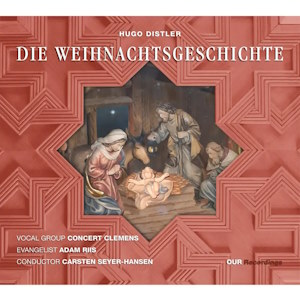
Hugo Distler (1908-1942)
Die Weihnachtsgeschichte (1933)
Adam Riis (tenor)
Concert Clemens/Carsten Seyer-Hansen (conductor)
rec. 2022, Skt Markus Kirken, Århus, Denmark
OUR Recordings 6.220684 SACD [40]
There’s something very sad about the life of Hugo Distler, a composer of enormous ability who, in many ways, lived in the wrong time. He was trained in music at Leipzig and attended the Thomaskirche, so he was steeped in the music of Bach, alongside that church’s other great tradition of what we’d now call early music. Furthermore, he was organist in Buxtehude’s church at Lübeck, a church which performed Schütz’s St Matthew Passion every Good Friday. These influences on him were enormous, and it’s from that tradition that his Weihnachtsgeschichte grows.
It’s very much in the great German tradition of sung Biblical narrative, but reinterpreted for the early 20th century. Most of the texts it sets are Biblical, both Old Testament and New, and texts and translations are usefully provided in the booklet note. However, Distler’s musical language is unashamedly tonal, warm and very approachable. The opening setting of “The people that walked in darkness” has lines that overlap one another, creating a sense of wonder at the unfolding mystery, and his choral writing throughout reflects the influence of those earlier masters that he so loved. The recitatives are set in a pretty straight and unfussy manner, the solo sections sounding almost like plainchant, and they’re punctured with bursts of choral colour, such as the angels’ song to the shepherds or Herod’s advisers naming Bethlehem.
The other recurring theme is Praetorius’ famous chorale Es ist ein Ros entsprungen, which appears seven times during the unfolding narrative, every time in a new harmonic language or arrangement. It gives musical unity to the unfolding structure, and Distler’s arrangements of it are very effective, particularly when he uses it as the accompaniment to Mary’s Magnificat.
If there’s a structural problem with the work then it’s that there’s a lot of recitative and not very much else. The Biblical narrative is so central that it tends to crowd out the more reflective passages, aside from those provided by Es ist ein Ros, and there are precious few of the contemplative passages you’d expect to find in Bach’s Christmas Oratorio, for example. It’s always appealingly warm, however, consistently focused around a tonal centre where chords resolve and melodies cohere, with a few harmonic swerves that tip a nod to the modernity of the 20th century in which Distler was living.
The choir of Concert Clemens sing with rarefied beauty and narrative engagement throughout. The whole work is a capella, and the tuning never slips once. The evangelist of tenor Adam Riis is never less than completely engaging, which is remarkable considering how much he is given to do, and the other brief solos (Mary, Herod etc) are sung with character and clarity. The church acoustic is beautifully atmospheric, too. There’s a big echo, but it places a very appropriate-sounding halo around the sound, often creating an effect that’s both meditative and quietly ecstatic.
Distler spend the last years of life in Nazi Germany in terror of being called up for military service, and he took his own life in 1942 having lost all hope for either the present or the future. This music of spiritual consolation and beauty holds out the hope that perhaps he had a spiritual life that went beyond the despair of his day-to-day and held out an eternal hope for what lay beyond.
Simon Thompson
Help us financially by purchasing from


















